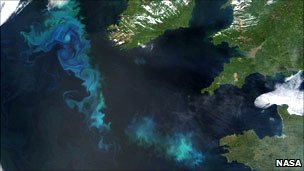The decline - about 1% per year - could be ecologically significant as plankton sit at the base of marine food chains. Algal blooms can be imaged from space
 Phytoplankton Population Drops 40 Percent Since 1950
Phytoplankton Population Drops 40 Percent Since 1950
Researchers find trouble among phytoplankton, the base of the food chain, which has implications for the marine food web and the world's carbon cycle.
The amount of phytoplankton - tiny marine plants - in the top layers of the oceans has declined markedly over the last century, research suggests.
They made their finding by looking at records of the transparency of sea water, which is affected by the plants.
